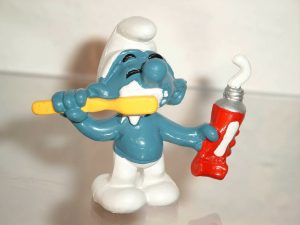Is Your Toothbrush Dangerous?

We wash our clothes, we change the oil in our cars, and we keep the dust off of our furniture. But how many of us show any TLC to one of the most important hygiene items in the house – our toothbrush?
Legend has it that a dog’s mouth is cleaner than a human’s. And, while that is only true in severe cases, our mouths, and therefore our toothbrushes, do harbor all kinds of bugs.
“The oral cavity is home to hundreds of different types of microorganisms, which can be transferred to a toothbrush during use,” said Dr. Maria L. Geisinger, assistant professor of periodontology in the School of Dentistry at the University of Alabama at Birmingham.
Here are some recommendations to make sure your toothbrush is safe to you and those around you:
- Don’t share toothbrushes and store different family members’ toothbrushes at least an inch apart.
- Rinse thoroughly after using.
- Allow toothbrush to air dry after each use, preferably in an upright position. This will keep bacteria from breeding. Don’t store in a small, moist, closed container.
- Replace your toothbrush after having a cold or the flu.
- If you have a compromised immune system, rinse your mouth with an antibacterial mouthwash before you clean your teeth. This can reduce the germs passed to your toothbrush.
- Get a new toothbrush every 3 to 4 months or more frequently if you notice the bristles breaking down. While this won’t reduce bacteria, it will ensure the best cleaning power.
And if that’s not enough, here’s one more thing for the list:
Keep your toothbrush as far from the toilet as possible, or you may be brushing with something you don’t want!
“If you have your toothbrush too close to the toilet,” microbiologist Charles Gerba, PhD, explains, “you are brushing your teeth with what’s in your toilet!” He explains that when you flush with the lid open, contaminated water vapor settles on surfaces in your bathroom, toothbrush included.
Having a clean toothbrush and brushing and flossing on a regular basis, are an important part of our overall health. If you have any questions about how to keep your teeth and gums healthy, or any other dental issues, we’re here for you!
To schedule an appointment, refer a friend or family member, or ask us about the latest advances in giving you the smile of your dreams, please give us a call at 248-973-8788. Please ask us about our electric toothbrush that we are currently selling. At Caring Smiles Family Dentistry, your health and comfort are our primary concerns!
At Caring Smiles Family Dentistry, we love sharing great dental health tips, contests, and special announcements on our Facebook and Instagram pages. Please join us on our journey of changing lives one smile at a time.

No comments